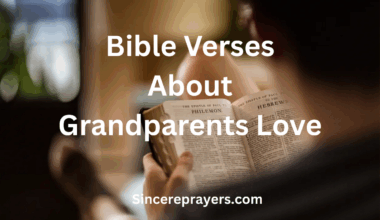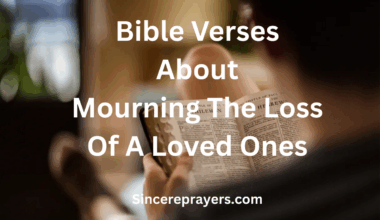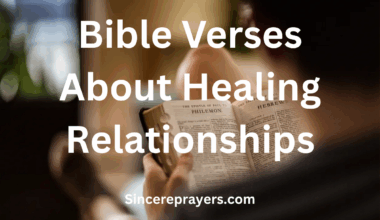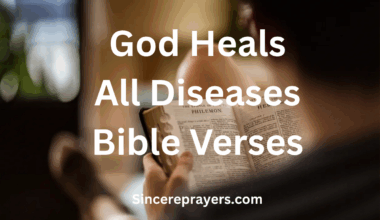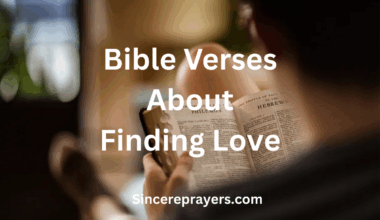These bible verses about love and forgiveness is replete with examples of God’s nature, two of which are love and forgiveness. Genuine love is a reflection of God’s heart, and forgiveness is a testament to the transformative power of His grace, according to the Bible. We emulate the divine when we show unconditional love and forgiveness, which promotes relationship healing and reconciliation. Following these guidelines is essential to leading a life that is in accordance with God’s will.
God’s love is enduring, gentle, and patient. Beyond human emotions and situations, it calls us to act altruistically, even toward people who may have harmed us. Alternatively, forgiveness is a spiritual mandate rather than just a moral decision. We can let go of our resentment and become conduits of God’s mercy by forgiving others. Humility, faith, and dependence on the Holy Spirit are necessary for both love and forgiveness, which are interwoven.
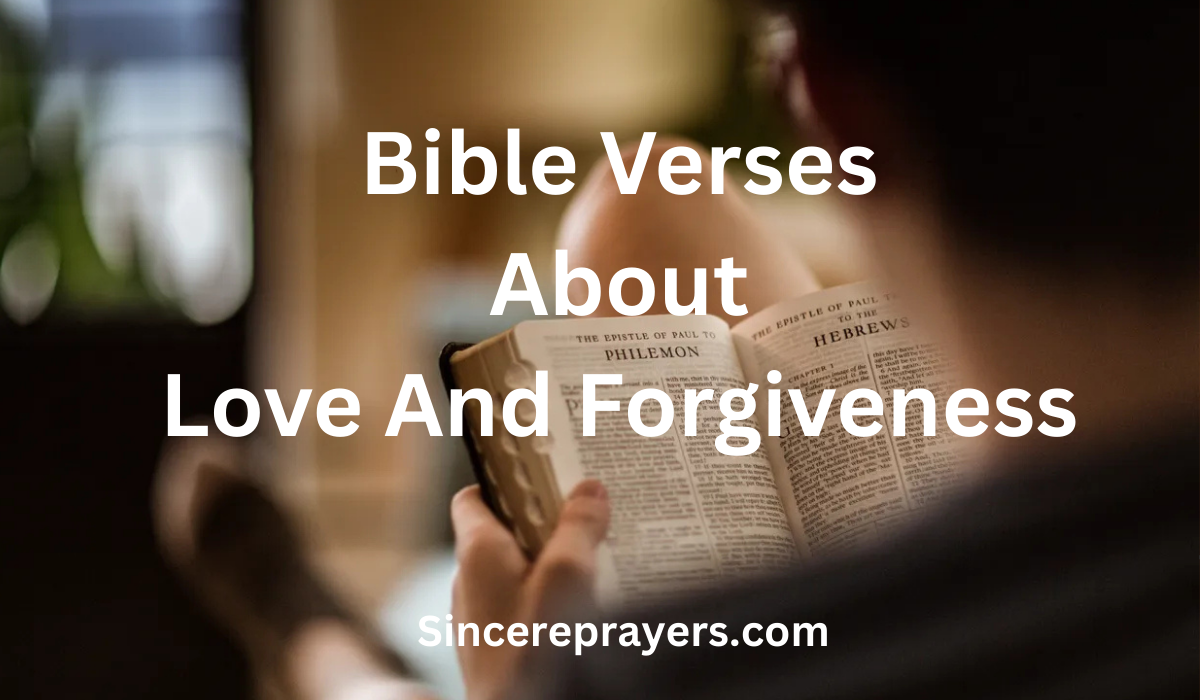
Numerous instances of love and forgiveness may be found throughout Scripture, ranging from God’s interactions with people to Jesus Christ’s teachings. These bible verses about love and forgiveness give believers advice on how to handle difficult relationships, deal with transgressions, and show grace beyond our own means. They serve as a reminder that love and forgiveness are necessary characteristics of a life centered on Christ and are not optional. Through them, we experience freedom, peace, and spiritual progress.
We examine the breadth of God’s love and the transformational potential of forgiveness in this collection of 35 potent Bible passages. An explanation is included with each verses to offer spiritual support and useful insights. Believers can develop hearts that mirror God’s nature, promote reconciliation, and build enduring relationships based on divine principles by reflecting on these Scriptures.
35 Most Beautiful Bible Verses About Love And Forgiveness in 2025
1. 1 John 4:19
“We love because he first loved us.”
This verse reminds us that our capacity to love originates from God’s love for us. Love is not merely a human emotion but a divine response to the grace we receive. When we internalize God’s love, it empowers us to extend it to others, even in challenging situations. By recognizing that love is rooted in God’s initiative, we cultivate patience, empathy, and kindness, reflecting His character in our daily interactions.
2. Ephesians 4:32
“Be kind and compassionate to one another, forgiving each other, just as in Christ God forgave you.”
Forgiveness is a tangible expression of God’s mercy, and this verse highlights its inseparable link with kindness and compassion. Christ’s forgiveness toward us sets the standard for how we should treat others. By forgiving, we release resentment, promote reconciliation, and demonstrate the transformative power of God’s grace. Forgiveness is not passive; it is an active choice reflecting a heart aligned with divine principles.
3. Colossians 3:13
“Bear with each other and forgive one another if any of you has a grievance against someone. Forgive as the Lord forgave you.”
This verse emphasizes patience and understanding in relationships, acknowledging human imperfection. Forgiveness mirrors God’s own act of releasing us from sin and judgment. By practicing forgiveness, we nurture unity, restore broken bonds, and prevent bitterness from taking root. It calls believers to extend the same mercy we have received, fostering communities grounded in love, humility, and grace.
4. Matthew 6:14
“For if you forgive other people when they sin against you, your heavenly Father will also forgive you.”
Jesus teaches that forgiveness is both relational and spiritual. Forgiving others opens the door to receiving God’s mercy, highlighting the reciprocity of grace. This verse challenges believers to relinquish grudges and trust God’s justice rather than seeking personal revenge. Forgiveness aligns our hearts with God’s purposes, ensuring that love and reconciliation, rather than resentment, guide our interactions with others.
5. Luke 6:37
“Do not judge, and you will not be judged. Do not condemn, and you will not be condemned. Forgive, and you will be forgiven.”
Jesus emphasizes that forgiveness and judgment are intimately connected. By choosing not to condemn others and offering forgiveness instead, we release ourselves from a cycle of negativity and receive God’s mercy in return. This verse reminds believers that our attitudes toward others reflect our spiritual state. Forgiveness is both an act of obedience and a pathway to personal freedom, allowing us to cultivate hearts of grace, humility, and understanding in every relationship.
6. Proverbs 10:12
“Hatred stirs up conflict, but love covers over all wrongs.”
Proverbs teaches that love has the power to neutralize conflict and heal brokenness. When we respond to offenses with love rather than hatred, we foster reconciliation and peace. Love does not ignore wrongdoing but chooses to prioritize mercy and restoration over resentment. This verse challenges believers to allow love to guide their interactions, demonstrating God’s character through patience, forgiveness, and a commitment to unity, even in the midst of disagreement or hurt.
7. Romans 12:10
“Be devoted to one another in love. Honor one another above yourselves.”
Paul encourages believers to practice selfless love, putting others’ needs above personal pride or resentment. This devotion cultivates forgiveness and empathy, fostering healthy, Christ-centered relationships. When we honor others, we create an environment where love prevails over conflict and misunderstandings. The verse highlights that true love is active and intentional, guiding us to act in ways that promote reconciliation, humility, and unity within families, communities, and the Church.
8. 1 Peter 4:8
“Above all, love each other deeply, because love covers over a multitude of sins.”
Peter reminds us that love has a protective and restorative quality. Deep love can transcend offenses, restore relationships, and maintain harmony despite human imperfection. By prioritizing love, we allow God’s grace to work through us, fostering forgiveness even when wrongs are repeated. This verse encourages believers to cultivate an enduring love that acts as a shield against bitterness, anger, and division, reflecting God’s own merciful and compassionate nature.
9. Matthew 18:21-22
“Then Peter came to Jesus and asked, ‘Lord, how many times shall I forgive my brother or sister who sins against me? Up to seven times?’ Jesus answered, ‘I tell you, not seven times, but seventy-seven times.’”
Jesus teaches that forgiveness has no limit. True forgiveness requires a continual, generous heart that mirrors God’s patience. By forgiving repeatedly, we demonstrate love that goes beyond mere obligation, reflecting God’s abundant grace. This verse challenges believers to abandon grudges, embrace humility, and pursue reconciliation, understanding that forgiveness is a spiritual discipline that strengthens character and deepens our reliance on God’s guidance in relational matters.
10. John 13:34-35
“A new command I give you: Love one another. As I have loved you, so you must love one another. By this everyone will know that you are my disciples, if you love one another.”
Jesus commands that love define our identity as His followers. This love is sacrificial, unconditional, and active, inspiring forgiveness and reconciliation in every interaction. By demonstrating God’s love in tangible ways, we serve as witnesses to His grace in the world. This verse teaches that love is both the hallmark of discipleship and the vehicle for forgiveness, guiding believers to cultivate compassion, patience, and understanding in all relationships.
11. Mark 11:25
“And when you stand praying, if you hold anything against anyone, forgive them, so that your Father in heaven may forgive you your sins.”
Jesus connects forgiveness directly to prayer. Harboring bitterness can hinder our spiritual intimacy with God. By forgiving others, we open our hearts to receive His mercy and align ourselves with His will. This verse teaches that forgiveness is not optional but essential for a flourishing relationship with God. It challenges believers to release grudges during prayer, fostering humility, reconciliation, and a deeper awareness of God’s unending grace.
12. Romans 5:8
“But God demonstrates his own love for us in this: While we were still sinners, Christ died for us.”
This verse highlights the depth of God’s love expressed through Christ’s sacrifice. Forgiveness is not earned by human merit but freely given through divine love. God’s act of sending Jesus while we were undeserving reveals that forgiveness flows from grace, not obligation. Believers are reminded that just as God loved and forgave us first, we are called to extend the same unconditional love and forgiveness to others, reflecting His mercy in our daily lives.
13. Matthew 5:44
“But I tell you, love your enemies and pray for those who persecute you.”
Jesus challenges conventional thinking by urging believers to love and forgive even their enemies. This radical command demonstrates that true love is not limited to those who treat us kindly but extends to all people. Forgiving and praying for adversaries transforms hostility into opportunities for grace. By following this teaching, believers reflect God’s boundless love and embody a faith that prioritizes compassion, mercy, and reconciliation over revenge or resentment.
14. Psalm 86:5
“You, Lord, are forgiving and good, abounding in love to all who call to you.”
This verse reminds us of God’s unchanging character—abundant love and forgiveness for all who seek Him. His goodness reassures believers that no sin is beyond redemption when we turn to Him with sincere hearts. God’s love is not selective but available to everyone who calls on His name. This truth inspires us to embrace forgiveness as part of our walk with Christ, extending mercy and grace in our relationships.
15. Micah 7:18
“Who is a God like you, who pardons sin and forgives the transgression of the remnant of his inheritance? You do not stay angry forever but delight to show mercy.”
Micah highlights God’s unique nature, emphasizing His joy in extending mercy and forgiveness. Unlike human tendencies to cling to anger, God chooses to pardon and restore His people. This verse teaches that forgiveness reflects God’s delight in reconciliation rather than punishment. Believers are reminded to follow His example by releasing bitterness, offering mercy, and delighting in the opportunity to heal broken relationships through love and grace.
16. Matthew 22:37-39
“Jesus replied: ‘Love the Lord your God with all your heart and with all your soul and with all your mind.’ … And the second is like it: ‘Love your neighbor as yourself.’”
Jesus identifies love as the foundation of all God’s commands. Loving God wholeheartedly naturally overflows into loving others, which includes forgiveness. This passage emphasizes that authentic love must be both vertical (toward God) and horizontal (toward people). Forgiveness becomes a natural response when love guides our actions. These verses call believers to make love central in every aspect of life, fostering reconciliation, peace, and unity within communities and families.
17. Luke 23:34
“Jesus said, ‘Father, forgive them, for they do not know what they are doing.’ And they divided up his clothes by casting lots.”
On the cross, Jesus models ultimate forgiveness toward His persecutors. His words reveal the depth of God’s mercy, even in the midst of suffering. This verse teaches that forgiveness is not contingent on others’ repentance but is a reflection of God’s unconditional love. Believers are called to extend forgiveness even in painful situations, following Christ’s example of love that overcomes hatred and transforms brokenness into opportunities for grace.
18. Proverbs 17:9
“Whoever would foster love covers over an offense, but whoever repeats the matter separates close friends.”
This proverb teaches that love nurtures reconciliation while gossip or repeated offenses destroy relationships. Covering an offense with forgiveness strengthens bonds and prevents division. By refusing to dwell on or spread wrongs, believers cultivate harmony and peace. This verse emphasizes the responsibility to protect relationships with grace, patience, and discretion. Forgiveness becomes an act of love that guards friendships and reflects God’s desire for unity within His people.
19. Galatians 5:14
“For the entire law is fulfilled in keeping this one command: ‘Love your neighbor as yourself.’”
Paul highlights love as the essence of God’s law. When believers genuinely love others, forgiveness flows naturally, fulfilling God’s standard for holy living. This verse teaches that love is not abstract but demonstrated through everyday actions, including grace, compassion, and mercy toward those who wrong us. Forgiving others reflects obedience to God’s command and nurtures communities where peace, justice, and harmony thrive under the guidance of the Spirit.
20. Hebrews 8:12
“For I will forgive their wickedness and will remember their sins no more.”
God’s covenant promise assures believers of His complete forgiveness. Unlike human memory that often clings to offenses, God chooses to forget sins once forgiven. This verse brings hope and encouragement, showing that divine love wipes away guilt and restores relationship with Him. Believers are reminded to follow His example by releasing past wrongs, choosing to forgive without holding onto bitterness, and embracing a lifestyle of love that reflects God’s mercy.
21. Isaiah 1:18
“Though your sins are like scarlet, they shall be as white as snow; though they are red as crimson, they shall be like wool.”
God promises complete cleansing from sin through His forgiveness. This verse reveals the transforming power of divine mercy that washes away guilt and restores purity. It teaches believers that no sin is too great for God’s redeeming love. By receiving His forgiveness, we are renewed and equipped to forgive others, offering the same grace and hope that God has extended to us.
22. 1 Corinthians 13:4-5
“Love is patient, love is kind. It does not envy, it does not boast, it is not proud. It does not dishonor others, it is not self-seeking, it is not easily angered, it keeps no record of wrongs.”
Paul describes the characteristics of true love, highlighting forgiveness as central. Love that “keeps no record of wrongs” demonstrates a heart free from bitterness. This passage reminds believers that forgiveness flows from love’s patience and kindness. By embodying these qualities, relationships are strengthened, conflicts are resolved, and God’s love is reflected through us. Love and forgiveness work hand in hand to cultivate unity, grace, and peace in every sphere of life.
23. 2 Chronicles 7:14
“If my people, who are called by my name, will humble themselves and pray and seek my face and turn from their wicked ways, then I will hear from heaven, and I will forgive their sin and will heal their land.”
God promises forgiveness and healing when His people repent. This verse shows the connection between humility, prayer, and divine restoration. Forgiveness is not only personal but also communal, leading to transformation within families, churches, and nations. It calls believers to seek God earnestly, confess sins, and embrace His mercy. Through forgiveness, God restores brokenness and brings renewal, proving His love is both restorative and redemptive for all who turn to Him.
24. 1 John 1:9
“If we confess our sins, he is faithful and just and will forgive us our sins and purify us from all unrighteousness.”
Confession opens the door to God’s forgiveness and cleansing. This verse reassures believers that forgiveness is guaranteed because of God’s faithfulness and justice. It emphasizes that forgiveness is not earned but received through repentance and faith. God’s love purifies hearts, removing guilt and shame. This truth empowers us to forgive others, recognizing that just as God has freely forgiven us, we must extend the same grace to those around us.
25. James 5:15
“And the prayer offered in faith will make the sick person well; the Lord will raise them up. If they have sinned, they will be forgiven.”
James connects forgiveness with prayer and healing. God’s love not only restores physical health but also grants spiritual renewal through forgiveness. This verse teaches believers the power of faith-filled prayer in addressing both sin and suffering. Forgiveness here is part of God’s holistic care, showing that love reaches every part of life. As we receive forgiveness, we are called to pray for and extend grace to others.
26. Matthew 5:7
“Blessed are the merciful, for they will be shown mercy.”
Jesus teaches that mercy is reciprocal—those who extend compassion and forgiveness will receive the same from God. This beatitude calls believers to practice love through mercy, letting go of grudges and offering kindness to those who wrong us. Forgiveness becomes a blessing, enriching both giver and receiver. By showing mercy, we embody God’s love and cultivate a lifestyle of grace that reflects Christ’s heart in all circumstances.
27. Psalm 103:10-12
“He does not treat us as our sins deserve or repay us according to our iniquities. For as high as the heavens are above the earth, so great is his love for those who fear him; as far as the east is from the west, so far has he removed our transgressions from us.”
This psalm celebrates God’s immeasurable love and forgiveness. Unlike human justice, God’s mercy removes sin entirely, offering complete freedom. His forgiveness is infinite and unchanging, rooted in divine love. Believers are reminded that God’s grace is beyond measure, and we are called to imitate His compassion by forgiving others fully. This passage assures us of God’s steadfast love that heals and restores us continually.
28. Zechariah 7:9
“This is what the Lord Almighty said: ‘Administer true justice; show mercy and compassion to one another.’”
God commands His people to practice mercy and compassion as expressions of love. Justice is not only about fairness but also about forgiveness and kindness. This verse calls believers to let forgiveness shape communities, ensuring relationships are restored rather than destroyed. By showing mercy, we reflect God’s character, create peace, and honor His will. Love and forgiveness here are presented as foundational to living faithfully before God and with others.
29. Colossians 3:14
“And over all these virtues put on love, which binds them all together in perfect unity.”
Paul teaches that love is the supreme virtue that unites all others, including forgiveness. Love binds humility, patience, and kindness, making them complete. This verse shows that forgiveness is sustained by love, which keeps communities and relationships intact. Believers are encouraged to wear love like a garment, letting it cover every action and decision. Through love, forgiveness becomes natural, leading to unity and peace that glorify God.
30. Matthew 7:12
“So in everything, do to others what you would have them do to you, for this sums up the Law and the Prophets.”
The Golden Rule captures the essence of love and forgiveness. By treating others with the grace and kindness we desire, we reflect God’s heart. Forgiveness here is practical, guiding our daily interactions and relationships. This verse teaches believers to act with empathy and compassion, fostering peace and reconciliation. Love and forgiveness become guiding principles for living in harmony with others and fulfilling God’s commands.
31. 2 Corinthians 2:7
“Now instead, you ought to forgive and comfort him, so that he will not be overwhelmed by excessive sorrow.”
Paul encourages the Corinthians to forgive and restore a repentant sinner. Forgiveness here is restorative, bringing healing rather than condemnation. By offering comfort, believers reflect God’s love, preventing others from being consumed by guilt. This verse shows that forgiveness is not just about releasing anger but actively helping others find renewal. Love and compassion work together to build communities of grace, healing, and encouragement.
32. Psalm 32:1
“Blessed is the one whose transgressions are forgiven, whose sins are covered.”
This psalm highlights the joy of receiving God’s forgiveness. Freedom from guilt brings peace and happiness, showing the blessing of divine mercy. God’s love does not expose our failures but covers them with grace. Believers are encouraged to embrace forgiveness, both in receiving it from God and in extending it to others. Forgiveness becomes a source of blessing, restoring joy and strengthening faith in God’s unfailing love.
33. John 15:12
“My command is this: Love each other as I have loved you.”
Jesus sets His sacrificial love as the model for how believers should treat one another. This love is unconditional and forgiving, extending even in difficult circumstances. By following this command, believers mirror Christ’s compassion and mercy, strengthening relationships and communities. Forgiveness is embedded in love, requiring humility and grace. This verse challenges us to love deeply, forgive freely, and reflect Christ’s example in every aspect of life.
34. Daniel 9:9
“The Lord our God is merciful and forgiving, even though we have rebelled against him.”
Daniel acknowledges God’s unwavering mercy despite human rebellion. Forgiveness is not based on our worthiness but on God’s boundless love. This verse reassures believers that even when we fall short, God remains faithful to forgive and restore. It encourages us to imitate His mercy by forgiving others, even when they wrong us repeatedly. Love and forgiveness here highlight God’s character and His call for us to reflect His grace.
35. Jude 1:21
“Keep yourselves in God’s love as you wait for the mercy of our Lord Jesus Christ to bring you to eternal life.”
Jude urges believers to remain rooted in God’s love while anticipating Christ’s return. God’s mercy assures eternal life, reminding us that His forgiveness is both present and future. This verse highlights the importance of abiding in love and practicing forgiveness as we live faithfully. By staying in God’s love, we prepare our hearts for eternity and extend His grace to others, cultivating a lifestyle shaped by mercy and hope.
Conclusion
For Christians, love and forgiveness are mandates that demonstrate who we really are as Christ’s disciples, not optional traits. Unconditional love is a reflection of God’s character, who loved us first. By forgiving, we embrace the serenity that results from living in accordance with God’s will and let go of the weighty burden of resentment. Together, these two qualities improve our relationships and fortify our religion.
The passages we have studied demonstrate the infiniteness of God’s love and the fullness of His forgiveness. He takes pleasure in showing mercy, forgives our sins, and exhorts us to show others the same kindness. Forgiveness promotes togetherness, mends wounds, and rebuilds connections. Even to those who don’t deserve it, love forces us to show grace. Together, love and forgiveness show how God’s Spirit is at work in us, transforming our lives into expressions of grace.
Keep in mind that love and forgiveness are daily decisions as you reflect on these 35 potent Bible passages. They call for patience, humility, and faith in God’s justice. However, when they are put into practice, they lead to genuine spiritual freedom, healing, and reconciliation. Allow these verses to serve as a guide as you develop a heart that embodies God’s love and extends forgiveness that releases both you and others. In addition to honoring God, we bring His light into a world in dire need of grace by showing love and forgiveness.
